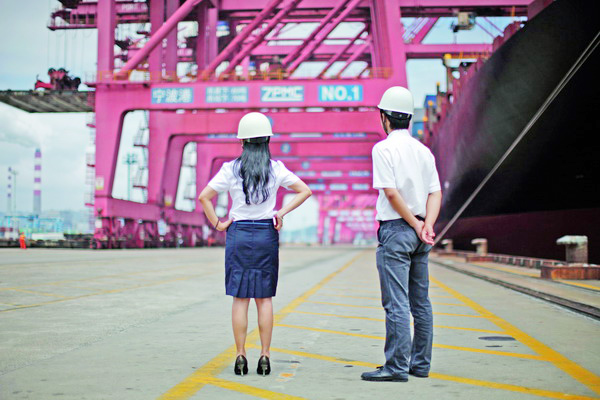Alarm bells jingle over Xmas exports
Updated: 2012-10-13 16:13
By Diao Ying, Ding Qingfen, Lin Jing and Yan Yiqi (China Daily)
|
|||||||||||
China's trade with Europe feels the chill as christmas-product firms face cold demand
Christmas is still two months away and although all the decorations and festive paraphernalia are well on their way from Chinese factories to European wholesalers, there is really nothing to be jolly about.
Businesses usually place their Christmas orders in late summer or early autumn, but by September this year, Chinese companies were already feeling the winter chill with as demand from Europe falls.
|
 Employees stand next to a container ship at Ningbo port in Ningbo, Zhejiang province. The uncertainty in the global economy, and the eurozone crisis in particular, have weakened China's exports. [Photo / Agencies] |
The traditional export powerhouses in eastern China say many European companies are not buying Christmas products, and those that do put in an order are buying less, or asking for much lower prices - sometimes even lower than the production cost.
Growth in exports and imports picked up in September, as China's latest efforts to stabilize foreign trade took effect, but the nation's target of 10 percent for this year's foreign trade is unlikely to be met, said an informed source.
China's exports in September were up 10 percent from a year earlier, compared with only 2.7 percent in August, and the nation's inbound shipments gained by more than 2 percent year-on-year while they had dropped by 2.6 percent in August, said the source on condition of anonymity.
China is scheduled to officially release its trade data for September on Oct 13.
Related reading: China's export growth picks up in Sept
Experts said the momentum for foreign trade still remains weak in the short term due to spreading European debt woes. This has cast a shadow over China's economic expansion, prompting the nation to take more steps to boost domestic consumption to sustain economic growth.
It also marks a turning point in trade between China and the EU, which had been growing steadily until last year. Bilateral trade reached $100 billion in 2003. Since then, it has increased at an annual rate of 20.8 percent, reaching $567.2 billion in 2011. The EU has been China's largest trading partner for eight consecutive years, and China has been the EU's second-biggest trading partner.
With the euro crisis continuing, bilateral trade faces a new scenario.
Data from the Ministry of Commerce show that for the first half of this year, China's exports to the EU dropped by 0.8 percentage points.
There is little sign that things will get better. Most forecasts say it will only get worse. In the latest issue of Global Outlook, a quarterly economic forecast published by Barclays, the bank estimates that the eurozone will barely grow in 2013.
The World Bank said recently that acute risk in the eurozone has been reduced thanks to the launch of the European Central Bank's bond-buying program and the German Constitutional Court's favorable ruling on the European Stability Mechanism.
However, the bank warns that uncertainties remain and developing countries are subject to risk from a poor performance in Europe.
"Should conditions in Europe deteriorate sharply, no developing region would be spared," the World Bank said in the East Asia and Pacific Data Monitor, released on Oct 8.
Trade has, for a long time, been the engine of economic growth for China as well as other countries in the east Asia and Pacific region, the report said, but it will "no longer contribute to the growth of the area at all" due to weak demand in the advanced economies.
Related Stories
France to boom economic, trade co-op with China 2012-10-12 17:23
China foreign trade growth target 'will be missed' 2012-10-12 10:19
China to offer $398m in loan subsidies to importers 2012-10-10 14:17
Global yuan trade settlement continues to rise 2012-10-10 09:56
WTO chief: China is the panacea, not the problem 2012-10-09 14:40
WTO chief downplays China-US trade imbalance 2012-10-03 08:52
Today's Top News
President Xi confident in recovery from quake
H7N9 update: 104 cases, 21 deaths
Telecom workers restore links
Coal mine blast kills 18 in Jilin
Intl scholarship puts China on the map
More bird flu patients discharged
Gold loses sheen, but still a safe bet
US 'turns blind eye to human rights'
Hot Topics
Lunar probe , China growth forecasts, Emission rules get tougher, China seen through 'colored lens', International board,
Editor's Picks

|

|

|

|

|

|





